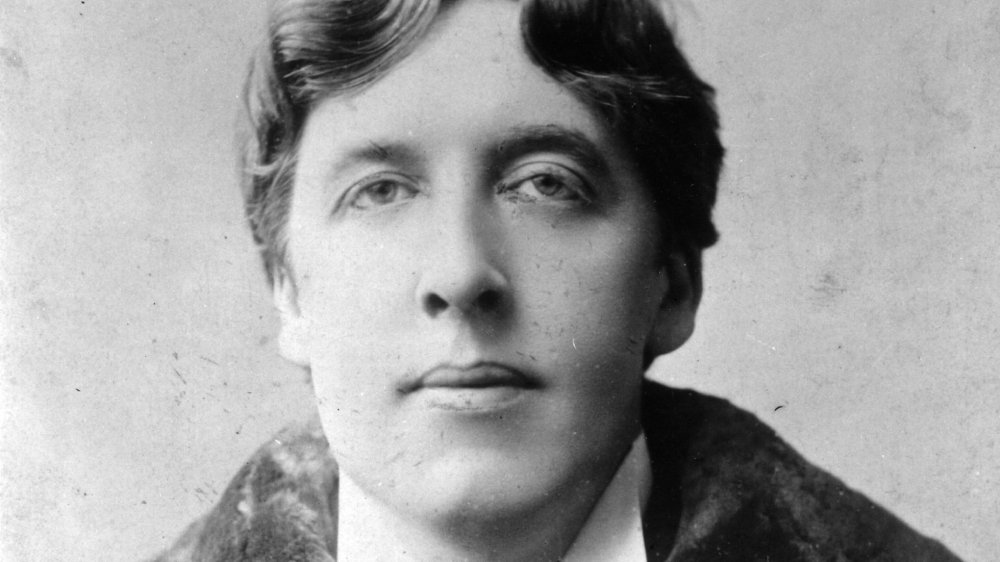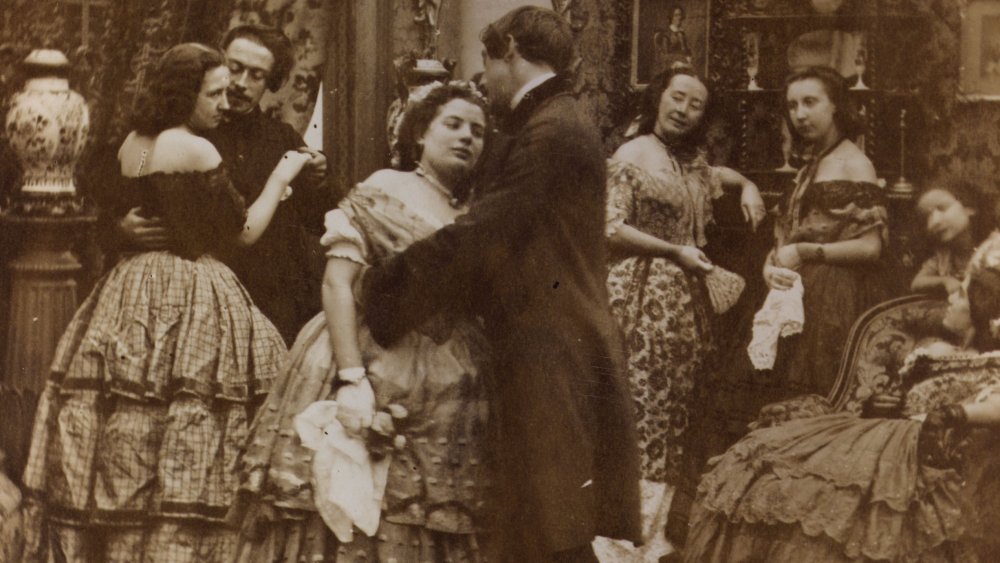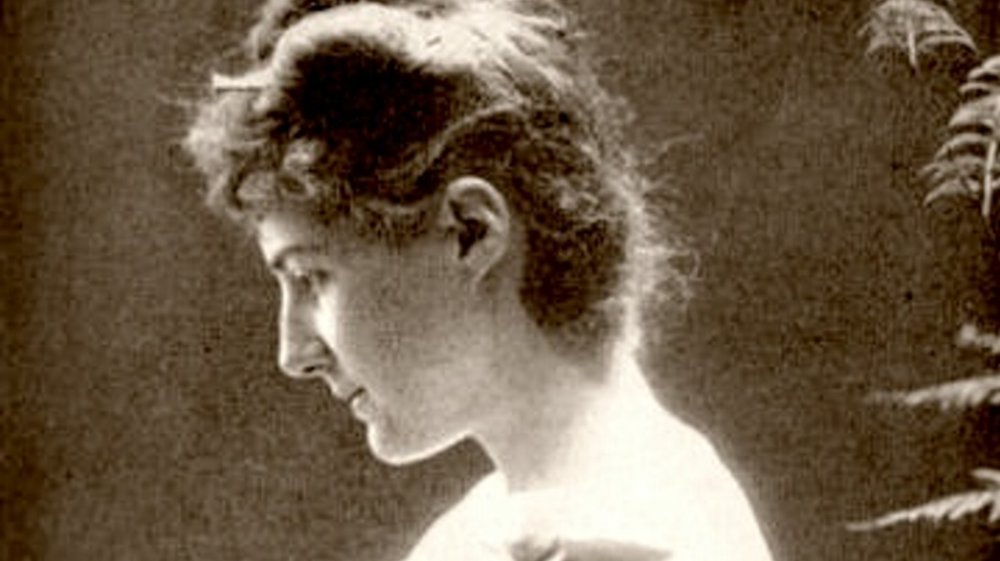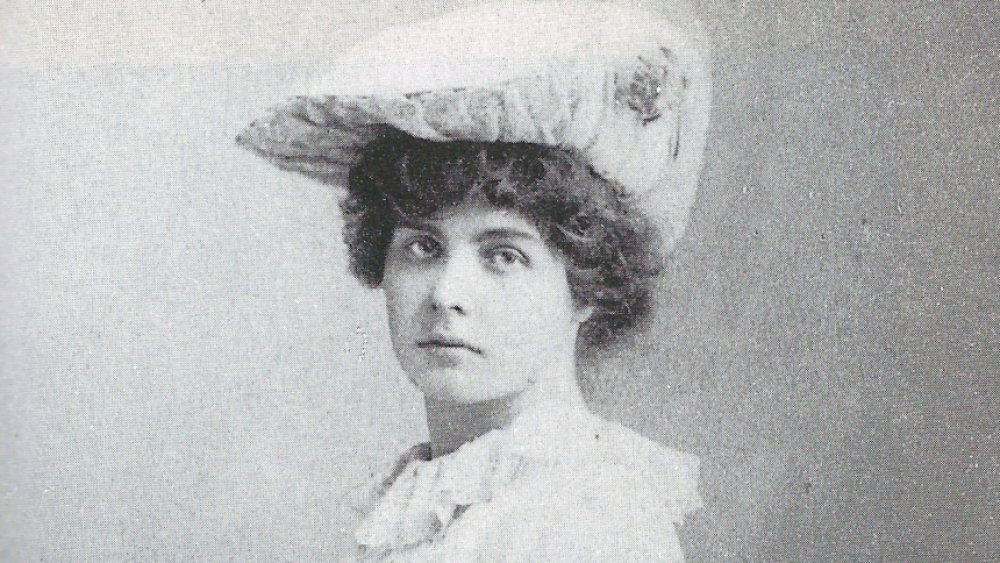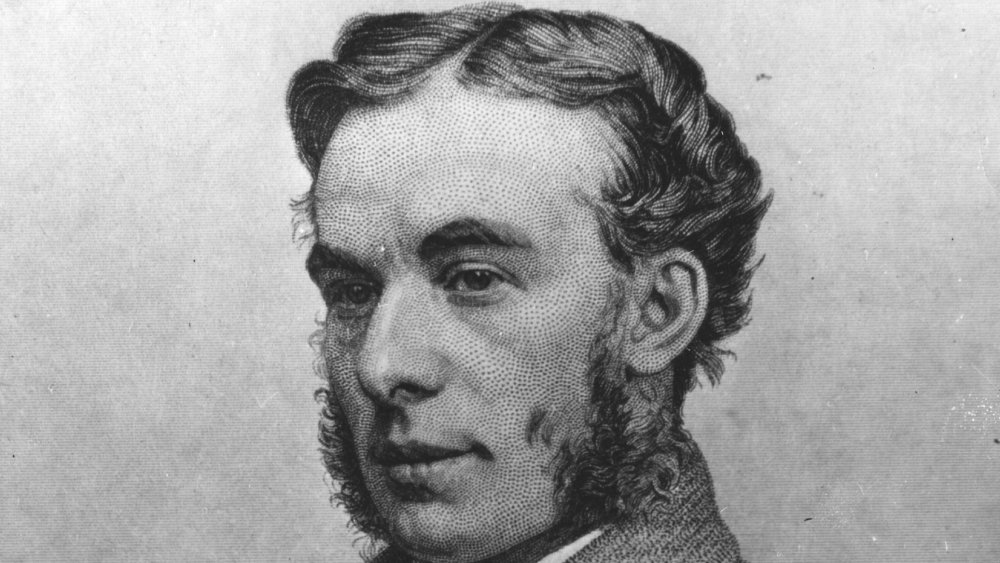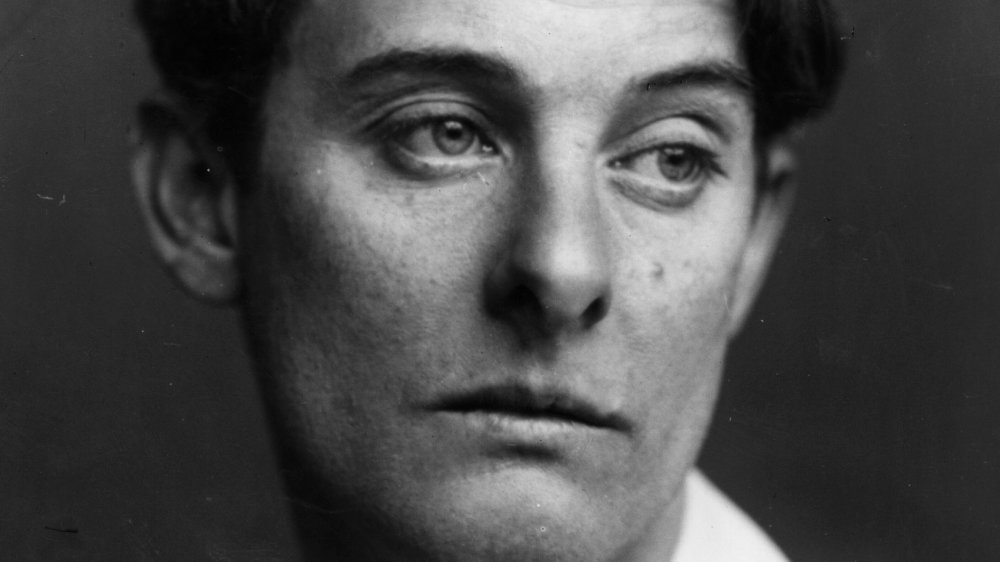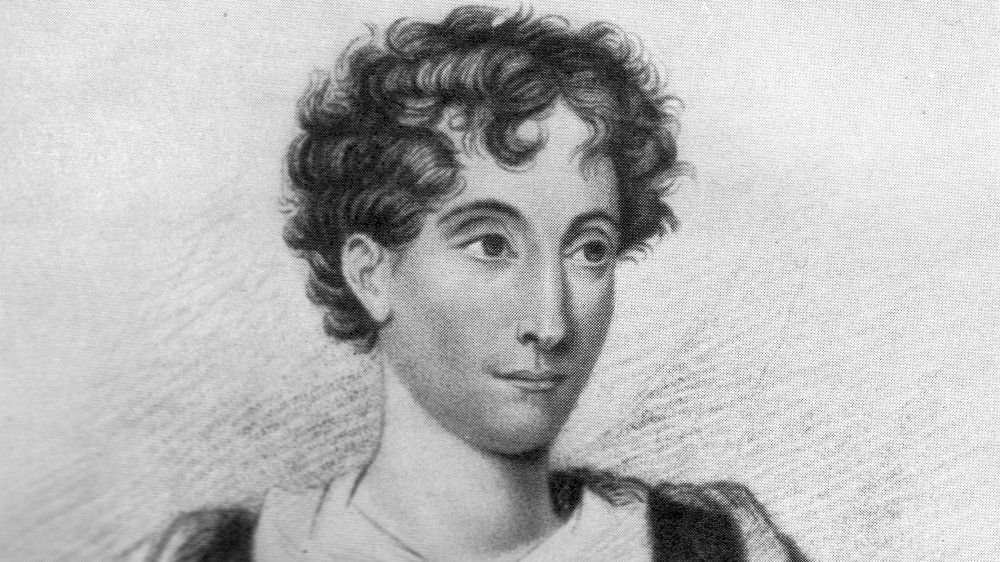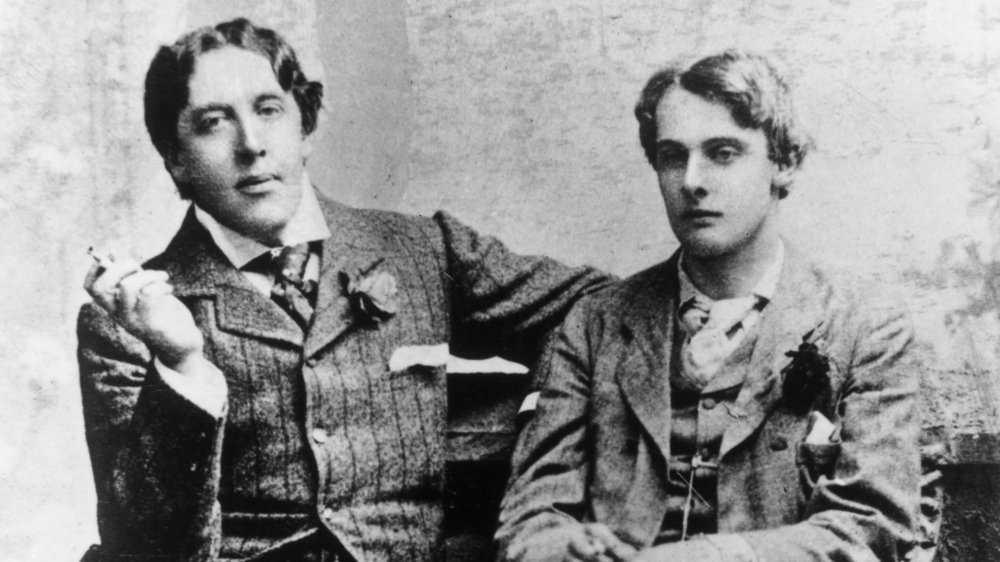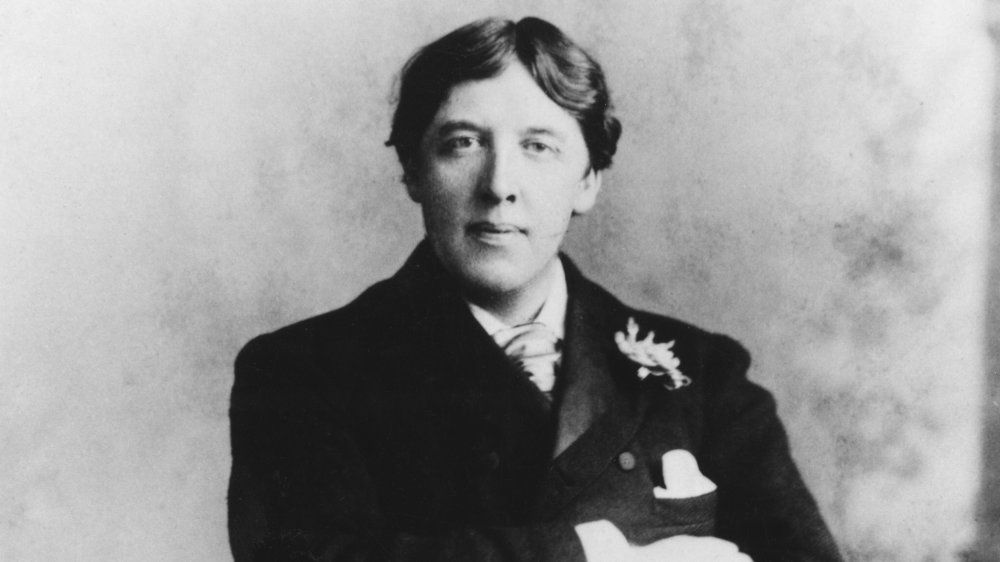The Tragic Real-Life Story Of Oscar Wilde
Literary icons come in several basic variations. Some are so historically distant and their work so much a product of their age that it's hard to relate to them as a human being. Some produce work that still resonates powerfully to this day, but the personality of the author has been lost to time, leaving a disconnection.
Then there are a literary icons like Oscar Wilde, who left behind not only a body of clever, emotionally powerful (and frequently hilarious) work but also a plethora of witty, perceptive quotes and observations that make the man behind the words feel real and modern. But what also makes it so easy to relate to Wilde is his depressing life story, which was a tale of an immensely talented man dogged by loss and unintended consequences. After all, even though he was skilled with words, he couldn't write enough to ward off death, disease, and betrayal. From a heartbreaking childhood to devastating love affairs, this is the tragic real-life story of Oscar Wilde.
Oscar Wilde suffered a tragic loss during his childhood
Oscar Wilde had his first encounter with tragedy when his younger sister Isola died unexpectedly after a short illness. Wilde was just 12 years old, and Isola was almost ten. He was very close with her, visited her grave regularly as a child, and he even kept a lock of her hair in an envelope for the rest of his life. Seven years later, he wrote the poem "Requiescat," which begins gently with the line "Tread lightly, she is near," and ends with the lines "All my life's buried here / Heap earth upon it."
Even more tragic, the discovery in 2014 of a secret journal written by Wilde offers evidence that there was more to Oscar and Isola's relationship. Angela Kingston, an author and Wilde scholar, notes (via The Irish Times) that the journal contains an alternative version of the poem with the lines "Had we not loved so well / Not loved at all / None would have tolled the bell / None borne the pall," and she speculates that this, combined with many references to dead golden-haired girls in his other work, indicates the writer blamed himself for Isola's loss.
The horrifying fate of Wilde's half-sisters
Isola wasn't the only sibling that Wilde lost, though he might not have been aware of his two half-sisters, Emily and Mary. The two girls were illegitimate and were raised by relatives in order to obscure the scandal. In 1871, when Wilde was 17 years old, Emily and Mary Wilde attended a Halloween party at a house in Ireland. Their host, Andrew Reid, asked one of the sisters to have a final dance at the end of the evening, and her dress somehow caught fire from the candles set up to illuminate the party. Her sister rushed to help her terrified sibling ... and her own dress caught fire. The flames were put out, but both girls suffered horrific burns and, according to Irish Central, died shortly thereafter.
Bizarrely — possibly in an attempt to suppress the scandal again — Irish historian Theo McMahon (via Atlas Obscura) found that the coroner's report changed the girls' names to "Miss M Wylie" and "Miss L Wylie," and the connection to the Wilde family never emerged beyond local oral histories. It's very likely that Oscar never even knew of Emily and Mary.
Oscar Wilde was in a heartbreaking love triangle
Oscar Wilde's mother, Jane, was a celebrated poet in her own right, and she held court at her home with creative people on a regular basis. These salons attracted some of the best and brightest artists and writers of the time. Wilde was frequently there as a child, and he likely polished his own wit and literary chops at these informal gatherings. It's also where he met a young woman he described as both an "exquisitely pretty girl" and as having "the most perfectly beautiful face I ever saw and not a sixpence of money."
Her name was Florence Anne Lemon Balcombe, and when she spent a holiday with the Wildes in Ireland, the two dated. The tragic ending of this relationship can also be blamed on Jane's salons, because one of the creative folks who attended on a regular basis was Bram Stoker, a really strange author who would write Dracula two decades later. According to Stoker biographer David J. Skal (via The Paris Review), when Wilde went off to school at Oxford, Stoker was a guest of the Wildes over Christmas, and not long afterwards, he and Balcombe were engaged. Wilde was reportedly devastated when he learned that the girl he loved was marrying someone else, though he and Stoker eventually patched things up.
Oscar Wilde's marriage turned cold
Oscar Wilde found love and settled down with a formidable woman, Constance Lloyd. A talented writer in her own right, Lloyd and Wilde married in 1884. According to author Franny Moyle (via The Guardian), Constance and Oscar were happy at first. She responded to his proposal with a note that said, "As long as I live you shall be my lover," and Wilde began advising all of his friends to get married.
Lloyd and Wilde shared a love for fashion and interior decoration, and they made for quite the stylish couple in London. They had two children, Cyril and Vyvyan, but Vyvyan's birth was reportedly quite difficult for Constance. After that, their connection cooled, and Lloyd began spending more and more time away from home, just as the Wildes took in a young man named Robbie Ross ... who soon became Wilde's lover.
It's uncertain when Lloyd realized that her husband was unfaithful. In fact, when Wilde sent another lover — Alfred "Bosie" Douglas — packing after a falling out, it was Lloyd who eventually invited Douglas back into their home and their lives. But it's definitely clear that after Vyvyan's birth, everything changed between Lloyd and Wilde, leading directly to the series of events that would eventually put Wilde in jail and ruin his career.
He could've avoided jail
Oscar Wilde met Lord Alfred "Bosie" Douglas, son of the Marquess of Queensberry, in 1891, and they soon became lovers. Douglas introduced Wilde to a world of gay prostitutes, which soon became a regular activity for Wilde. However, Douglas' father (pictured) was a conservative and outspoken man, and he and Wilde had several confrontations about the writer's relationship with his son, culminating with the Marquess leaving a card for Wilde at the author's club, with a message written on it for all the world to see that read, "For Oscar Wilde, posing somdomite' (sic)."
This was a dangerous accusation, but Wilde had options. Historians note that he could've fled to France, where homosexuality wasn't illegal and just waited for the publicity to fade. But instead, worried about his public image and urged on by Douglas, he chose to sue the Marquess for libel. This was a disastrous mistake, because the only way the Marquess could win was to prove his allegations, which was very, very easy to do. Wilde had never been particularly discreet, and old Bosie was more or less the exact opposite of "restrained."
The libel trial ended in the Marquess' favor, and the evidence presented was immediately used to charge Wilde with gross indecency, a crime often used to prosecute homosexuals. A few months later, Wilde was in prison, and five years later he was dead. And it all could've been avoided if Wilde had taken a vacation.
The man who destroyed Oscar Wilde was awful
Oscar Wilde will always be remembered for his wit and writing, as well as his imprisonment for "gross indecency" in 1895 when he was 41 years old. The charges stemmed from his relationship with Lord Alfred Douglas, son of the Marquess of Queensberry. See, England had passed a law in 1885 making "gross indecency" a crime, and it was mainly used to prosecute homosexuals (and remained on the books until 1867). Of course, Wilde's ordeal might have been more bearable if Douglas had been worthy of devotion, but he ... wasn't.
According to biographer Douglas Murray (via The Guardian), Douglas not only failed to defend Wilde after encouraging him to file the libel lawsuit that led to his downfall, but he then spent the rest of his life working to malign Wilde (he referred to his former lover as "the greatest force for evil that has appeared in Europe during the last 350 years" in 1918), possibly smarting from the devastating letter Wilde wrote while in prison, "De Profundis," which didn't cast Douglas in a good light, to put it mildly.
Douglas was also a fierce anti-Semite, and when he wasn't trying to run down Wilde, he was writing about Jewish conspiracies. In the final analysis, if your life is going to be ruined by a forbidden love, the object of that love should at least be a decent human being.
His wife died tragically
You might imagine that discovering your famous, wildly talented husband had been having plenty of affairs and cavorting with prostitutes would make someone a little angry ... and you would be right. Although his wife, Constance Lloyd, seems to have tolerated some of Oscar Wilde's early affairs (possibly because they involved artists and even mutual friends), the revelations and consequences of Wilde's trial for "gross indecency" in 1895 drove a wedge between them. She changed her name (and their sons' name) to Holland and demanded that Wilde relinquish custody, moving the children to Switzerland, where they never saw their father again.
And yet she never truly abandoned him. As noted by author Franny Moyle (via The Guardian), she visited Wilde in prison, praised his later work, and never divorced him. But Lloyd would be one more loss that Wilde had to endure in the final days of his tragic life. She spent her last years in constant pain that doctors failed to diagnose, and she tragically died at age 39 after a botched surgery that was probably meant to repair a prolapsed bladder. For more than a century, her pain and resulting symptoms were a mystery, but in an article published by The Lancet in 2015, Dr. Ashley H. Robins and Wilde's grandson, Merlin Holland, concluded that she was probably suffering from multiple sclerosis. Wilde, who would die just two years later, had to travel to Genoa, Italy, to lay flowers on her grave.
Even Oscar Wilde's pseudonym was depressing
Oscar Wilde was a man who loved his fame. According to HuffPost, author David M. Friedman thinks Wilde invented so-called "celebrity culture" in America with his lecturing tour in 1882, and when Wilde had achieved fame, his actual work slowed down to a crawl in favor of being something of a professional dinner guest.
In other words, Wilde was never a man who shied away from the limelight, but after his arrest for "gross indecency" (read: being gay) in 1895 and his subsequent time in jail, he seemed to lose that drive. In fact, it got so bad that as he wandered Paris and other parts of the world after his release from prison, he adopted an assumed name: Sebastian Melmoth. Since Wilde was still Wilde, this name was heavy with literary significance, referring to an 1820 novel by Charles Maturin (Wilde's great-uncle, pictured above) about a man who sells his soul for an extra 150 years of life, only to spend it wandering the world in search of someone who will take over the debt.
Douglas betrayed him a second time
Lord Alfred "Bosie" Douglas was instrumental in Wilde's fall. First, he encouraged him to sue his father, the Marquess of Queensberry, for libel after the Marquess accused Wilde of being homosexual at a time when it was illegal in England. And things got even worse when Douglas didn't defend Wilde in court. So it was shocking to everyone around Wilde when he met Douglas in Rouen in 1897 ... and then moved into a rented villa in Naples with him.
Author Nicholas Frankel writes that the two men were perpetually broke despite allowances from Wilde's wife and Douglas' mother, and they were forced out of a hotel when the other guests protested against their presence. No one could quite believe Wilde would take up with Douglas again, but even when Wilde's wife threatened to end his allowance, the writer refused to leave Bosie. Douglas, on the other hand, gave in and left Naples, and his mother sent Wilde £200 to stay away. It's not difficult to imagine that this final betrayal and heartbreak led to his lonely, impoverished death two years later.
At the time of his death, he was lonely and broken
Oscar Wilde wasn't just a great writer. He was also an amazing dinner guest and celebrity, sought after for his company and his frequent witticisms. Even when in jail and immediately after his release, Wilde managed to produce two remarkable pieces of writing — "De Profundis," a letter exploring both the relationship with Lord Alfred Douglas that landed him in jail and his spiritual awakening during his sentence, and the poem "The Ballad of Reading Gaol," describing an execution he witnessed and exploring themes of imprisonment and brutality.
But during his final years in Paris, according to author Nicholas Frankel (via The Guardian), this brilliant and funny man spent his time largely alone, drinking heavily and living in cheap motels (he wrote to his publisher a few months before he died and declared, "This poverty really breaks one's heart"). His separation from his children reportedly weighed him down, and the ruin of his professional career couldn't have been easy. Worst of all, for a celebrated writer, he wasn't working, declaring that he had "lost the joy of writing." Still, even in his final days when he was bedridden, he had that Wilde wit. His hysterical last words were reportedly, "My wallpaper and I are fighting a duel to the death. One or the other of us has to go."
Oscar Wilde died in agony
Oscar Wilde was all about aesthetics. He believed that art existed for its own sake, and that beauty was a purpose unto itself. In fact, he and his wife, Constance Lloyd, were known for creating a "House Beautiful" in their early, happier years. So it was something of a terrible insult that for a very long time, Wilde was rumored to have died of syphilis, a rumor clearly inspired by his decadent lifestyle and gay affairs.
For a man dedicated to the ideals of art and beauty, his final days contained neither. Broke and lonely, he lived in a series of cheap hotels, and an ear infection that had troubled him for years appears to have flared up. According to Dr. Howard Markel (via Michigan Radio), Wilde probably died of meningitis stemming from this infection, and his last days were probably spent in terrible agony. Markel dismisses the idea that Wilde had syphilis, noting that he showed no other symptoms of the disease, and his family also never showed any signs of it. But that doesn't change the fact that a man who created so much beauty for us to enjoy died in misery, after losing everything.
